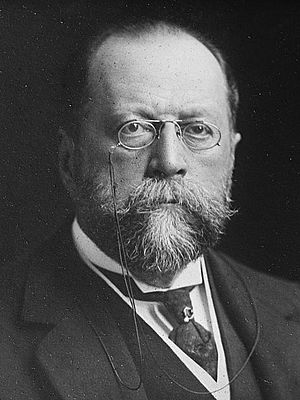Paul Vinogradoff facts for kids
Quick facts for kids
Paul Vinogradoff
|
|
|---|---|
 |
|
| Born | 18 November 1854 O.S. Kostroma, Russian Empire |
| Died | 19 December 1925 (aged 71) Paris, France |
| Nationality | Russian (to 1918); British (from 1918) |
| Education | Doctor of Science (1887) |
| Alma mater | Imperial Moscow University |
| Subject | Medieval Europe |
| Notable works | Villainage in England: Essays in English Medieval History |
| Spouse | Louise Stang |
| Children | 2 |
Sir Paul Gavrilovitch Vinogradoff (Russian: Па́вел Гаври́лович Виногра́дов; 18 November 1854 – 19 December 1925) was a very important historian from Russia and later Britain. He was especially known for studying the Middle Ages, a period in European history between ancient and modern times.
Contents
Early Life and Education
Paul Vinogradoff was born in a city called Kostroma in the Russian Empire. He went to a local school there, called a gymnasium. After that, he studied history at Moscow University. His teacher was a famous historian named Vasily Klyuchevsky.
After finishing his studies in 1875, Paul received a special scholarship. This allowed him to continue learning in Berlin, Germany. There, he studied with other important historians like Theodor Mommsen.
Career as a Historian
Paul Vinogradoff became a history professor at the University of Moscow. He was very keen on making education available to more people. However, his ideas sometimes clashed with the government at the time. Because of these disagreements, he had to leave Russia.
He then moved to England. In England, Paul used his brilliant mind to study the social and economic life of early England. He had actually started this research back in Moscow.
Visiting Britain and Oxford
Paul first visited Britain in 1883. He worked with old documents in the Public Record Office. He also met leading English scholars, like Sir Henry Maine and Sir Frederick Pollock. One of the most important people he met was Frederic William Maitland, who was greatly influenced by Paul.
In 1903, Paul Vinogradoff was chosen for a special job at the University of Oxford. He became the Corpus Professor of Jurisprudence. This means he taught about the history and theory of law. He held this important position until he passed away in 1925.
He also received special honors from many universities. In 1917, he was made a knight, which means he was given the title "Sir." The next year, in 1918, he and his children became British subjects, meaning they became British citizens.
Later Years
During World War I, Paul Vinogradoff helped the British government. He gave them valuable advice about Russian affairs.
In 1925, Paul traveled to Paris, France, to receive another honorary degree. While he was there, he became ill with pneumonia and sadly died on December 19.
Important Books
Paul Vinogradoff wrote many important books about history. His book Villainage in England (published in English in 1892) is considered one of his most important works.
In this book, he explained a lot about the lives of ordinary people in the feudal age in England. He showed that the "villein" (a type of peasant farmer) in Norman times was actually a descendant of the free people from Anglo-Saxon times. He argued that early Anglo-Saxon communities were free, not controlled by lords. He also explained how the status of these free people slowly became worse around the time of the Norman Conquest.
Another important book he wrote was The Growth of the Manor (1905). This book continued to explore how land was owned and managed in early England. He also wrote English Society in the Eleventh Century (1908), which looked at how English society was organized around the time of the Norman Conquest.
His book Outlines in Historical Jurisprudence (1920–22) explored how basic legal ideas, like marriage and property, developed in different types of societies throughout history.
Selected Works
Here are some of Paul Vinogradoff's other notable works:
- Villainage in England, Clarendon Press, 1892.
- The Teaching of Sir Henry Maine: An Inaugural Lecture, Henry Frowde, 1904.
- The Growth of the Manor, George Allen & Company, 1911.
- English Society in the Eleventh Century, Oxford: Clarendon Press, 1908.
- Roman Law in Medieval Europe, Harper & Brothers, 1909.
- Common-sense in Law, H. Holt and Company, 1914.
- Self-government in Russia, Constable, 1915.
- Outlines in Historical Jurisprudence (Introduction and Tribal Law), Oxford University Press, 1920.
- Outlines in Historical Jurisprudence (The Jurisprudence of the Greek City), Oxford University Press, 1922.
Other Writings
Paul Vinogradoff also wrote many essays and articles, including:
- "The Reforming Work of Tzar Alexander II." In Kirkpatrick, F. A., Lectures on the History of the Nineteenth Century, Cambridge University Press, 1902.
- "Social and Economic Conditions of the Roman Empire in the Fourth Century." In Gwatkin, H. M. The Cambridge Medieval History, Vol. I, The MacMillan Company, 1911.
- "Foundations of Society (Origins of Feudalism)." In Gwatkin, H. H. The Cambridge Medieval History, Vol. II, The MacMillan Company, 1913.
- "Russia: The Psychology of a Nation," Oxford Pamphlets, Oxford University Press, 1914.
- The Russian Problem, George H. Doran Co., 1914.
- "The Task of Russia." In Stephens, Winifred. The Soul of Russia, Macmillan & Co., 1916.
- "Magna Carta, C. 39. Nullus Liber Homo, etc." In Malden, Henry Elliot. Magna Carta Commemoration Essays, Royal Historical Society, 1917.
- "The Situation in Russia." In The Reconstruction of Russia, Oxford University Press, 1919.
 | Isaac Myers |
 | D. Hamilton Jackson |
 | A. Philip Randolph |

